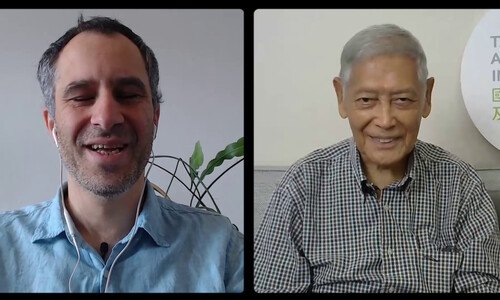Raining in the Mountain
Press Play to start
Theatrical Screenings
Muranów
Muranów
Online Availability
Additional Materials
Film description
At the invitation of a dying abbot, a host of dignified guests arrives at a mountain Buddhist monastery. They are all old friends of the abbot, but their visit has a sinister purpose. Each of them is eyeing a very valuable ancient manuscript held in the monastery. Thus begins a dangerous game of cunning individuals, full of fleeting alliances, betrayals, and lies. In the meantime, the head of the monastery is on a mission to choose his successor.
"Raining in the Mountain" may be one of King Hu's lighter oeuvres, with the labyrinthine monastery becoming the scene for a series of brilliantly portrayed scuffles, but the film is also filled with epic moments, breathtaking shots, and serious reflections on human nature that ensured its place among the most important Chinese productions in history. The film was shot in South Korea, in the stunningly beautiful 8th-century temple Bulguksa and the surrounding forest.
text:
Marcin Krasnowolski
King Hu
Born in Beijing in 1932, grew up surrounded by classical Chinese painting and literature. At the age of 18, he moved to Hong Kong to create advertising posters, then went on to work for the famous Shaw Brothers Studio. After the success of "Come Drink With Me," a film that revolutionized the genre of wuxia, he moved to Taiwan to shoot "Dragon Inn," which enjoyed an enthusiastic reception. His next film, "A Touch of Zen," took three years to make and is widely considered to be his masterpiece. Hu's subsequent productions, shot in various locations including South Korea, form part of the ambitious wuxia canon but remain fairly unknown outside of Asia. King Hu is regarded as the visionary of action cinema who created the trends that remain present in mainstream productions to this day.
1966 Napij się ze mną / Da zui xia / Come Drink with me
1967 Dragon Inn / Long meh kezhan / Dragon Gate Inn
1971 Dotyk zen / Xia nu / A Touch of Zen
1973 Ying chun gez hi / The Fate of Lee Khan
1979 Deszcz w górach / Kong shan ling yu / Raining in the Mountain
1979 Legenda gór / Shan zhong zhuan qi / Legend of the Mountain
1983 Koło życia / Da lunhui / The Wheel of Life (jedna z nowel)
1993 Hua pi zhi: Yin yang fa wang / Painted Skin






